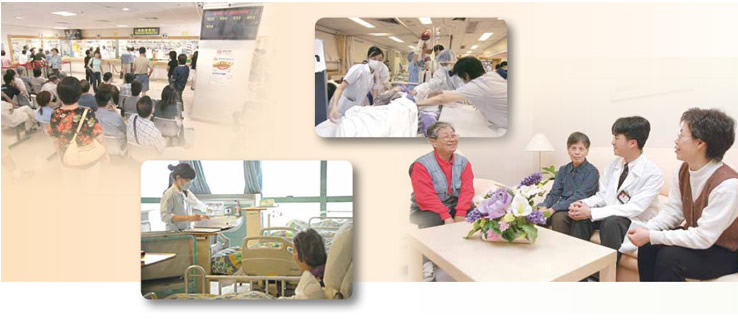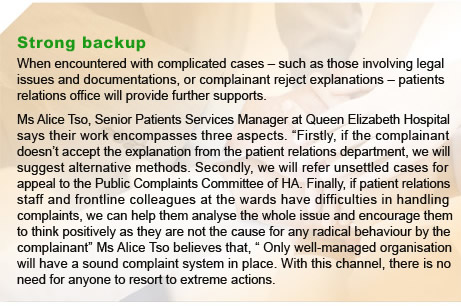


|
||||||||
|
Like the huge number of patients and their families HA hospitals serve everyday, the amount of appreciations, complaints, enquiries and requests our colleagues received is overwhelming. Entrusted with the responsibility of facilitating communications among the hospitals, patients and their families, the patient relations departments in various clusters have a crucial role to play. |
||||||||
|
|
||||||||
|
HA has a well-established and effective system in managing complaints. Ms Kitty Siu, Patient Relations Officer of Princess Margaret Hospital explains, "when a case is received, we need to find out what the problem is first before responding to the complainant on the same day. We then refer the case to relevant hospital department for follow-up. When we receive the investigation report and advice from the hospital management, we will ask the doctor concerned to explain to the complainant. " |
|
|||||||
|
|
Patient relations officers needs to mediate from a third-party perspective. Ms So Yuen-chun, Senior Manager (Patient Relations) at United Christian Hospital stresses the importance of active listening. Patients and our staff see things from different angles. Our responsibility is to facilitate consensus. We also have to make colleagues understand that we'll handle the case without taking any sides. To minimise complaints, Ms So would nip any hiccups in the bud before it develops into big troubles. Maintaining good relationship with patients is certainly a great challenge. Mrs Ivy Chan, Senior Manager (Patient Relations & Engagement) of HA Head Office, recalls a thorny case: "The complainant was a patient's son who stayed at the ward day and night to make sure that his mother was being well taken care of. But he grumbled about everything. The ward staff had been working under this intangible pressure for years. To address the problem, we arranged two trained colleagues to deal with him. Gradually, the tension subsided and fewer complaints were received. " Patient relations personnel have to be flexible and tactful when confronted with emotional complainants. On one New Year day, Ms Kitty Siu met families of a patient who just passed away. Angry family members pointed their fingers at the doctor-in-charge. Ms Siu immediately settled the family members to a separate room. After talking with them, she learnt that the deceased patient was the family's breadwinner. "That explained their reaction. I then liaised with a medical social worker and helped them successfully apply for the contingency fund. When they have calmed down, I arranged them to meet with the doctor again," says Ms Siu. |
|
Challenged by great work pressure, it is is essential for patient relations officers to have a positive mindset. "We share and exchange our case handling experiences in the daily meeting. We brainstorm and work out the best solution together. We treasure the opportunity of learning from each case," says Ms Katherine Ngai, Patient Relations Office In-charge of Pamela Youde Nethersole Eastern Hospital remarks. "It is nice to settle a case and have everyone feel happy. But our hard work would not go unnoticed, even if the problem cannot be solved, as we still gain gratitude and trust from patients," she says.
|
|
||||



